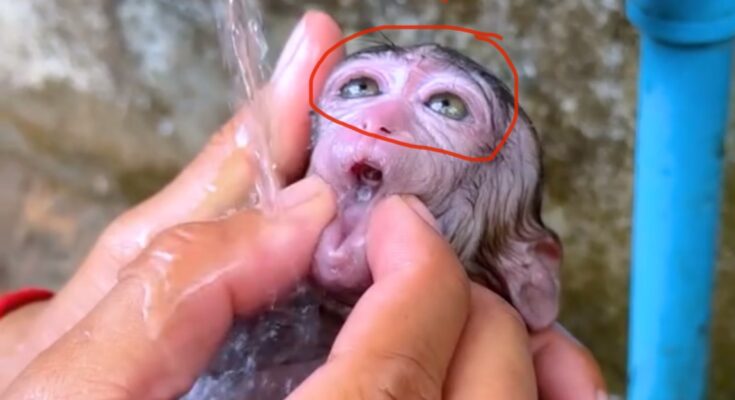The relationship between humans and animals is often built on affection and curiosity, leading many people to treat young animals with the same care and playfulness they give to children. However, a recent tragic incident involving a baby monkey serves as a heartbreaking reminder that even the kindest intentions can have devastating consequences when wildlife is handled without proper knowledge or supervision.
According to witnesses, the young monkey had been given a bath, a practice that some caretakers or pet owners use either for cleanliness or entertainment. While the activity may have seemed harmless, the situation took a fatal turn within moments. Water reportedly entered the infant monkey’s lungs, causing rapid respiratory distress. Before help could be provided, the baby monkey died almost instantly.
Although the details surrounding the event vary, the tragedy underscores a critical truth: bathing wild animals—especially very young ones—can be far more dangerous than it appears. Infant animals have delicate respiratory systems, limited ability to regulate body temperature, and a natural instinct to panic when submerged or restrained. Even a small amount of water entering the nasal passages or lungs can lead to aspiration, a condition where liquid travels into the respiratory tract, resulting in suffocation, pneumonia, or immediate collapse.
This heartbreaking situation also calls attention to a broader issue: the growing trend of people keeping wild animals as pets or treating them like domestic companions. Baby monkeys, with their expressive faces and playful behavior, may seem endearing, but they require specialized care, professional handling, and environments that mimic their natural habitats. Without proper knowledge, even basic tasks—such as feeding, cleaning, or bathing—can put their health and lives at risk.
Animal welfare experts emphasize that bathing primates is rarely necessary and should only be done under the guidance of trained caregivers. Unlike humans, monkeys are naturally capable of grooming themselves. Introducing unnecessary bathing not only creates physical danger but also places the animal under immense stress. Sudden movements, slippery surfaces, or accidental water inhalation can become fatal within seconds.
The incident has sparked conversations online about responsible animal care and the importance of understanding the needs of wildlife. Many advocates urge individuals not to attempt domestic-style grooming or handling practices on wild animals. Instead, they encourage the public to rely on rehabilitation centers, sanctuaries, and trained professionals who understand the complexities of primate health and behavior.
Ultimately, the loss of the baby monkey is a stark reminder that good intentions are not enough when caring for animals—knowledge, respect, and proper training are essential. This tragedy should serve as an educational moment, guiding people away from risky practices and toward more responsible, informed interactions with wildlife.



